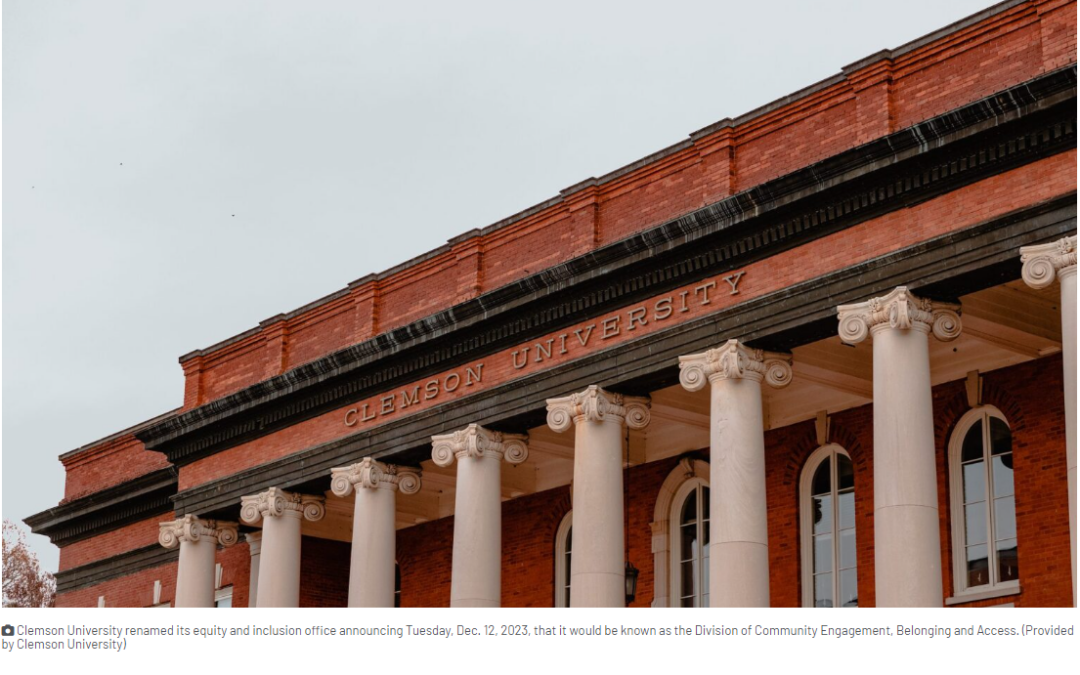CLEMSON – Clemson University renamed its equity and inclusion office following leadership changes, making it the second major college in South Carolina to drop language that has become politically charged in the past year.
As of last week, the new name of Clemson’s department is the Division of Community Engagement, Belonging and Access.
The rebranding reflects an expansion of the office and its responsibilities, said Felicia Benton-Johnson, vice president for diversity and inclusive excellence, who stepped in to head the division in March.
“It’s becoming broader,” Benton-Johnson said.

Benton-Johnson is laying plans to grow existing programs and add to the division’s responsibilities. For that reason, she said the terms “inclusion and equity” were too “narrowly focused.”
“That doesn’t encompass everything that we’re doing,” she said.
Changes to the Upstate college’s equity and inclusion division come four months after the University of South Carolina struck “diversity, equity and inclusion” from its own cabinet-level office. It also changed the title of its leader, Julian Williams, to vice president of access, civil rights and community engagement.
Unlike her USC counterpart, Benton-Johnson retained the phrasing in her title.
When USC made the change, spokesman Jeff Stensland told The Post and Courier, it was to “better align existing areas.”
All of this has taken place against a backdrop of national and state-level political attacks on the phrase. Florida governor and GOP presidential candidate Ron DeSantis has boasted about banning “diversity, equity and inclusion,” or DEI, language at the state’s public universities.
In South Carolina’s Legislature, the ultra-conservative Freedom Caucus launched a failed attempt during the House budget debate in March to pull state funding for salaries or programs that support DEI, resulting in a lengthy GOP-versus-GOP floor fight. Ultimately, Republicans not in the Freedom Caucus swatted down the proposals, calling them sloppy and the timing inappropriate, as they struck money from the colleges but didn’t necessarily touch the programs.
Rep. R.J. May, a Freedom Caucus co-founder, said he doesn’t care what universities call their DEI programs.
If the objectives remain the same, his caucus will continue to oppose them, said the Lexington Republican.
“DEI seeks to divide us based on the color of our skin and that’s wrong,” May said.
‘All encompassing’
Benton-Johnson, who has worked in the DEI field for 25 years, acknowledged the political pressures across the country and possible impacts on institutions.
Since the U.S. Supreme Court’s ruling last summer striking down the consideration of race in college admissions, commonly known as affirmative action, the impacts have rippled beyond academia, prompting lawsuits against private corporations.
But politics are not the only reason for the shift.
“I would say that it has a bearing but that it’s not the full bearing,” Benton-Johnson said.
Nationally, DEI work is becoming more “all encompassing,” Benton-Johnson said, and groups are making name swaps to reflect that.
At Clemson, Benton-Johnson said her team will work alongside other departments on degree accreditation and research grants. To gain accreditation for new degree programs, colleges are required to show how they’ll broaden participation and be inclusive as part of the approval process with the accrediting agencies, she said.
Clemson also has the goal of doubling its research load. The National Science Foundation, National Institutes of Health, U.S. Department of Defense and U.S. Department of Education also have made inclusion a part of federal grant applications, Benton-Johnson said.
“In order for us to get these research dollars, we have to have a ‘broadening participation’ area,” she said.
Before, a lot of faculty were left to do this work on their own. Benton-Johnson said her office will help make the process more institutionalized and less ad hoc.
Finally, the newly named Division of Community Engagement, Belonging and Access will continue to aid community programs, such as hosting science and math camps for middle and high school students and taking Clemson’s mobile health care unit into rural communities that need it.
“Clemson has so much going on and so many times people think, when we’re talking about inclusive excellence work, it just centers around diversity,” Benton-Johnson said. “But it goes beyond that.”
‘Work we have to do’
Still, political pushback is likely to continue.
Following similar requests by Republican-dominated Legislatures in other states, South Carolina lawmakers required in February that colleges report their DEI spending to the Commission on Higher Education.
Clemson spends $2.5 million on employees and programming. The university employs 21 DEI staff members and historically has run seven commissions representing various races, genders, sexual orientations and disabilities within its equity and inclusion division.
USC spends $2.1 million on salaries for staff and training across its entire university system, with majority of that centered at its Columbia campus.
“We’re wasting millions of state dollars on programs that divide rather than bring us together,” May said.
Politicians opposed to this programming argue hiring and admissions decisions should be merit-based. They’ve said training on unconscious bias and anti-racism are being forced on university staff and students, influencing grading, hiring and evaluation practices.
“At the very heart of it, it is modern-day, reverse racism.” May said.
Benton-Johnson said DEI work is focused on making all people feel as if they belong and are valued.
May said House leadership has promised a vote on a Freedom Caucus-sponsored bill that stops colleges from mandating participation in DEI training. If a vote is not held, May said the caucus will again push to strike DEI spending from the budget.
Even if attempts to pull state funding are successful, Benton-Johnson said equity and inclusion efforts are likely to remain, with faculty taking it on at an individual level within their programs and research.
“No matter what, the work is going to continue, because the people who are doing the work are passionate,” she said. “As a society, this is work we have to do.”
–scdailygazette.com



